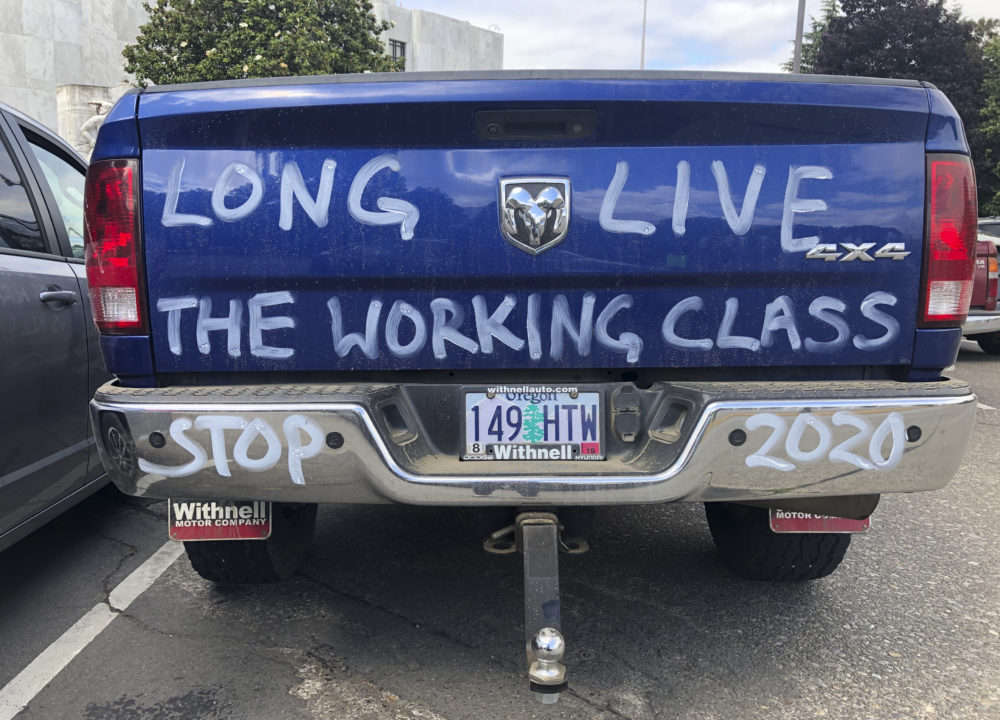Advertisement
Commentary
The Recession Still Isn't Over — For Men

The economic news this summer mixed triumphalism with caution. On one hand, the recovery from the Great Recession notched its place as the longest in American history, with unemployment at a half-century low. On the other, would President Trump’s heedlessness — his foolish trade war with China, debt-be-damned budgets and failure to invest in prosperity engines such as education — bring the boom to bust?
The debate overlooked a sad reality: For prime-age working men (not women), the recession never ended.
The jobless rate among all males aged 25 to 54 stands at 13.7%, higher than the 12.8% just before the lights went out on the economy in 2007. Notice I said “jobless,” not unemployed. That’s to avoid confusion: Attentive readers will ask, hasn’t the official unemployment rate fallen? Yes, but that’s because many people gave up looking for work and left the labor market, which means they also exited the government’s official count of the “unemployed.”
All told, 8.5 million men in this age bracket either can’t find work or have despaired of finding it, such that they aren’t looking. “The American Working Man Still Isn’t Working,” as Foreign Affairs magazine headlined a recent report.
The rise of the long-term jobless, who mostly worked in low-wage industries before losing their jobs, coincides with another eye-catching development involving the poorly paid still clinging to work. They’re clustering in Republican-supporting, rural congressional districts that are being outpaced by prospering urban, Democratic districts.

“Where Republican areas of the country rely on lower-skill, lower-productivity ‘traditional’ industries like manufacturing and resource extraction, Democratic, mostly urban districts contain larger concentrations of the nation’s higher-skill, higher-tech professional and digital services,” a Brookings Institution report says. It goes on to add that “those economies are diverging fast,” with Democratic areas surging in household-income growth while GOP strongholds slip backwards.
This news may trigger knee-jerk mythologies.
First up, if some workers are simply unable to procure work, our current polarized political landscape might lead at least some supporters of President Trump to crow: See, we told you that immigrants were stealing our jobs! But that’s incorrect. The rural areas that are the president’s diehard base are largely devoid of immigrants. (As a slew of studies make clear, racial resentment and xenophobia, not alleged jobs theft, is one motivator among Trump's base.)
Advertisement
Rural America’s hard times owe, rather, to the intellectual capital and urban attractions that have made cities magnets for high-skilled people and businesses. And the xenophobia present in some rural districts isn’t based on job-stealing, but rather lack of familiarity with foreign-born people (and perhaps too much Fox News). A poll by the Washington Post and Kaiser Family Foundation found that the hostile sentiments “soften in rural areas with significant foreign-born populations.”
... unless they can demonstrate they care about the least among us, Republicans are flirting with political irrelevance.
You needn’t support Trump to buy into a second prehistoric myth: the documented attitude of some employers that the long-term jobless must either be incompetent or lazy. From personal experience, I can tell you that such views belong to an alternate reality — I looked relentlessly for work for more than a year when the recession hit.
The long-term jobless aren’t unskilled, lazy bums. What they are, according to Brookings, is less college-educated than their Democratic counterparts. Lack of a bachelor's degree renders workers less attractive to professional and digital services employers swarming to cities.
Hobbled by educational shortcomings and the high cost of relocating to areas with more jobs, it’s not surprising that the American working man is in such dire straits. The effects are devastating, not just to wallets but to health, relationships, and even life itself, in the notorious deaths of despair, by suicide, drugs and alcohol.
You’d think our Republican president and lawmakers would be hell-bent on helping these voters in their districts. Instead, their signature economic achievement has been a tax cut for wealthy individuals and corporations, most of which, predictably, did not unleash the promised jobs-and-pay-raises bonanza.
Meanwhile, the left hasn’t been standing still. Congresswoman Alexandria Ocasio-Cortez just released her own anti-poverty plan, adding to several proposed by the party's presidential candidates.
The GOP didn’t ask me for advice and surely won’t take it (though I'm a Republican), but here’s what they should do to help workers — be they stuck without jobs or poorly paid. These ideas pay homage to Lincoln, the first Republican president, who pioneered federal help to the needy. And unless they can demonstrate they care about the least among us, Republicans are flirting with political irrelevance.
Instead of blowing taxpayer dollars on tax cuts, they should spend on public works to create well-paying jobs. They should reorient current farm aid toward healthy-food farms and farmers’ markets, for both nutritional and employment payoffs. They should rewrite laws impeding unionization, as higher rates of union membership helped to keep inequality at bay back in the day.
Republicans should experiment with generous cash grants to the poor, employed and not. They should commit themselves to universal health insurance, so that the jobless can pay medical bills and all Americans needn’t face the gnawing fear of unaffordable sickness. Free public college could put income-and-job-prospects-boosting degrees in more hands.
Most of this agenda could be paid for by raiding less effective programs and repealing tax loopholes, both of which were once GOP orthodoxy. Accepting the wisdom of that orthodoxy would be progressive politicians’ part of the bargain.
For their part, the long-term jobless could throw out xenophobia as their motivating political principle. Hating the stranger is more than un-American. It’s also useless in ending what has become for too many an unending recession.
